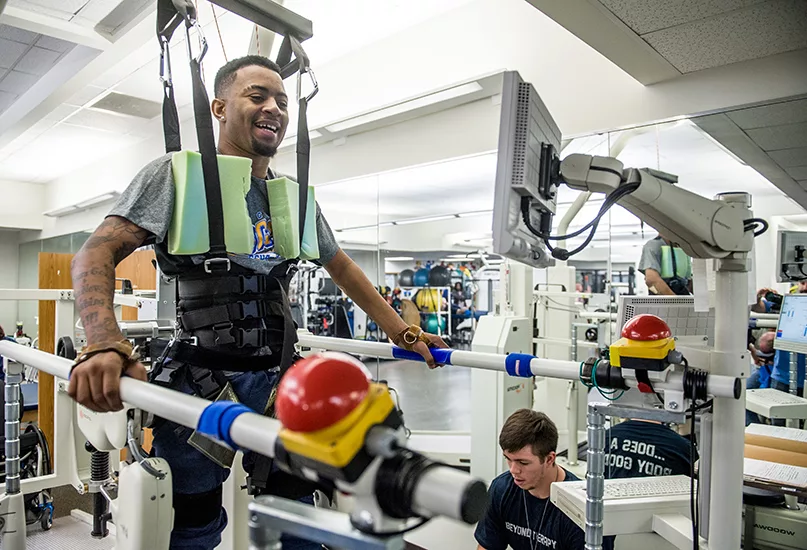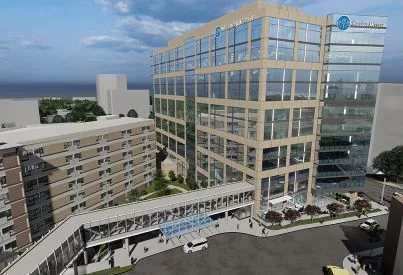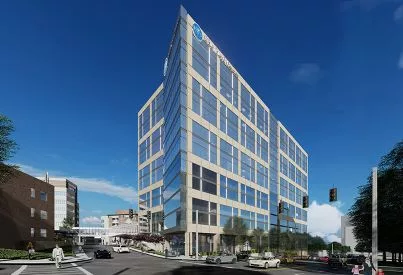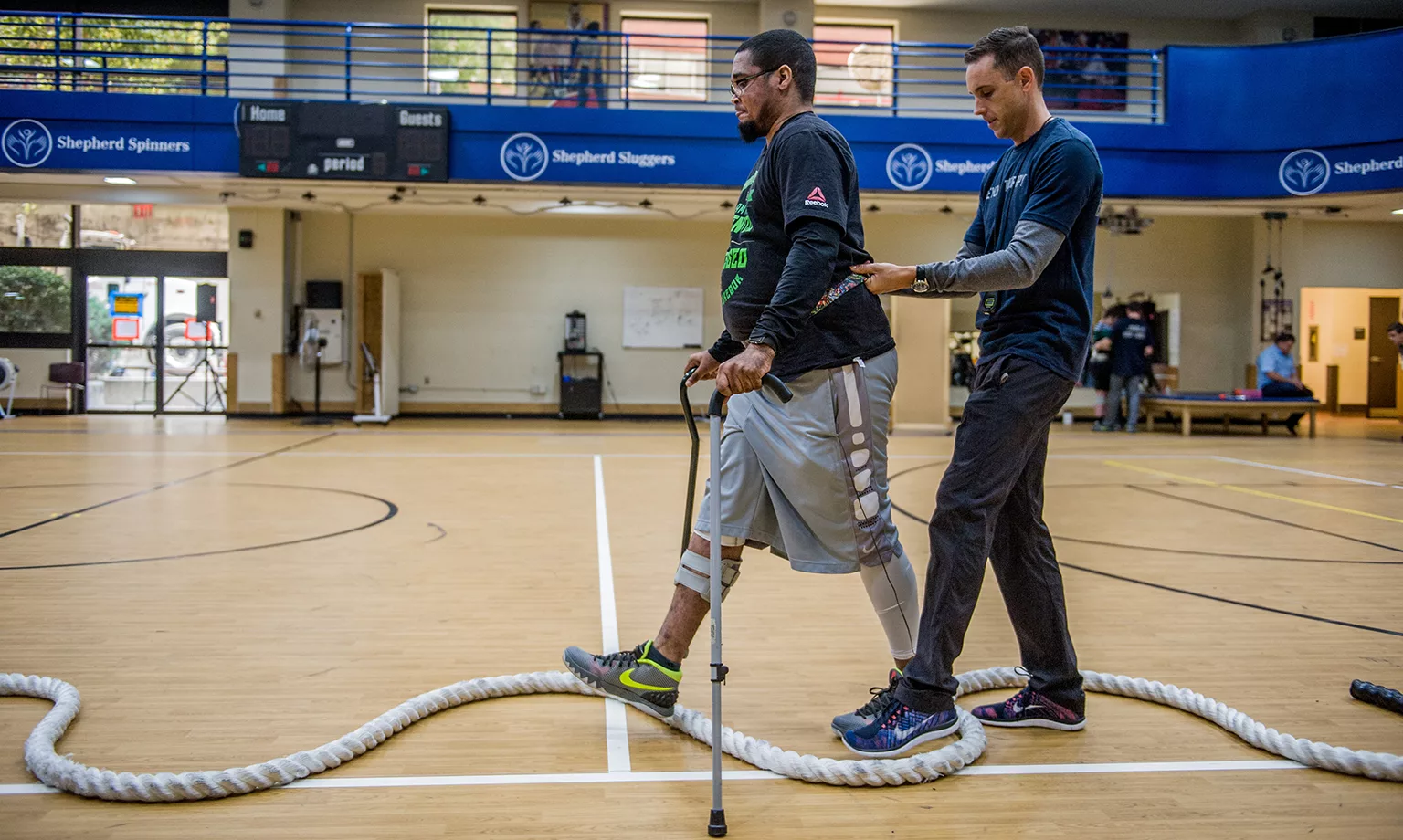Providing world-class clinical care for complex conditions like spinal cord and brain injuries, Shepherd Center is a vital pillar of rehabilitation care. Vice President of Research and Innovation Deborah Backus tells us more.
COMPREHENSIVE CLINICAL CARE, RESEARCH, AND FAMILY SUPPORT
Established in 1975, Shepherd Center (Shepherd) is widely recognized for its comprehensive clinical care, research, and family support for people experiencing the most complex conditions, including spinal cord and brain injuries, multi-traumas, traumatic amputations, strokes, multiple sclerosis (MS), and pain.
Ranked among the top rehabilitation hospitals in the nation by U.S. News, 90 percent of Shepherd’s patients return to their communities after receiving care, which exceeds the national average by more than 20 percent. It is also one of the few institutions recognized as both a Spinal Cord Injury and Traumatic Brain Injury Model System by the National Institute on Disability, Independent Living, and Rehabilitation Research (NIDILRR).
“Our mission is to help people who have experienced catastrophic injury or disease to rebuild their lives with dignity, hope, and independence, advocating for their full inclusion in all aspects of community life,” opens Deborah Backus, PT, Ph.D., FACRM, Vice President of Research and Innovation at Shepherd.

The organization is accredited by the Joint Commission (JCAHO) and the Commission on Accreditation of Rehabilitation Facilities (CARF), and is a catastrophic care hospital dedicated to neurorehabilitation.
FOUNDED ON CARE
Shepherd’s mission is close to the founders’ hearts. In 1973, late co-Founder James Shepherd, then 22 years old, went on a backpacking trip after graduating from the University of Georgia. While bodysurfing off a beach in Rio de Janeiro, he was pushed to the ocean floor by a wave and sustained a spinal cord injury. With no rehabilitation facilities close to his home in Atlanta, Georgia, the Shepherd family traveled to a specialized facility in Denver.
Upon his return to Atlanta, James and his parents, Harold and Alana Shepherd, were compelled to create a rehabilitation facility. With generous community support, Shepherd was founded in 1975 as a six-bed unit operating out of leased space. After outgrowing that space, the hospital moved to its own facility. Today, Shepherd has grown to a 152-bed hospital. As part of Pursuing Possible: The Campaign for Shepherd Center, the hospital will expand to 200 beds.

SCIENCE AND ACTIVITY
Throughout its nearly 50-year history, Shepherd’s research and innovation initiatives have grown with a primary focus on improving patient outcomes and paving the way for greater independence beyond injury and illness.
“Shepherd was founded on an innovative spirit driven to fill a need for top-tier complex rehabilitation, and it continues in that spirit to find improved approaches to patient care today,” Dr. Backus says.
A core component of Shepherd’s clinical care and research initiatives is addressing the concept of neuroplasticity, which has remained at the forefront of neurorehabilitation.
“Neuroplasticity refers to the nervous system’s potential to change with learning or recovery.
“After an injury or when someone has a disease like MS, neural pathways are altered or damaged. We’re trying to retrain the nervous system to complete tasks in a way that’s effective and efficient,” she explains.
One of Shepherd’s research aims was to assess evidence related to what drives neuroplasticity. One approach is to combine intense activity with other methods, such as electrical stimulation or pharmacologic drug approaches, to achieve better outcomes.
An example is Shepherd’s post-acute outpatient program, Beyond Therapy®, created by Shepherd staff in 2005. The rigorous, activity-based program is designed to help people with various neurological disorders improve lifelong health, minimize secondary complications, and get the most from any new neural links to their muscles.
While standard therapy focuses on helping people develop strategies to become as independent as possible after injury or illness, Beyond Therapy® serves clients who have already participated in traditional rehabilitation. It combines exercise science and rehabilitation science to drive the nervous system, focusing on weaker muscles and nerve connections that may not have gotten much attention in the initial stages of therapy. The goal is to improve functional recovery and reduce the likelihood of secondary health issues.
A team of exercise physiologists, physical therapists, and other clinical, research, and administrative staff contribute to the program’s success. Beyond Therapy® was built upon evidence related to neural recovery, and Shepherd continues to collect data to examine the effectiveness of the approaches used in the program. The development of the Beyond Therapy® program exemplifies how a culture that supports research and innovation allows ideas to grow into impactful advances in patient care.

IMPROVING CARE THROUGH RESEARCH
To ensure that the organization provides the necessary care to its vast range of patients in need, Shepherd is underpinned by various research initiatives.
“Much of our research is focused on evaluating ways to bring together the right tools to achieve changes in the nervous system. This is not just for walking, but also the function of the arms and hands, bladder, and sexual and cognitive function,” Dr. Backus highlights.
Shepherd’s Virginia C. Crawford Research Institute was founded in 1996 to broaden the organization’s research program and support the integration of research into clinical practice. Federal and industry-sponsored clinical studies are conducted with leading experts at other hospitals, research centers, medical schools, and universities worldwide.
The principal investigators and research associates at the Crawford Research Institute work to develop, refine, and evaluate new treatments, drugs, surgical techniques, diagnostic tools, and physical therapeutic interventions.
One such area is the Andrew C. Carlos Multiple Sclerosis Institute at Shepherd. MS research at Shepherd includes both clinical trials and rehabilitation, and wellness intervention trials. Shepherd researchers lead clinical trials testing investigational medications, new cell therapies, and new devices to help people with MS participate more fully in their lives.
The team also conducts studies to better understand the effects of physical and cognitive rehabilitation and exercise interventions, focusing on people with MS that have mobility challenges or barriers to accessing rehabilitation interventions. Shepherd shares its findings with healthcare providers outside of the organization so that people with MS worldwide can access the best care.

PARTNERING TO ADVANCE RESEARCH
Sharing knowledge is a cornerstone of making progress, which is why Shepherd has more than 200 industry and academic partnerships to advance research and innovation.
“We identify collaborators in the same way an academic institution would; are their areas of research the same areas we are hoping to expand into, and what do they bring that’s unique?” Dr. Backus questions.
Shepherd’s range of research programs is integral to advancing its value-added care offerings. In particular, using data analytics helps garner a greater understanding of the most meaningful interventions to achieve the best outcomes possible.
“Shepherd was founded on an innovative spirit driven to fill a need for top-tier complex rehabilitation, and it continues in that spirit to find improved approaches to patient care today”
Deborah Backus, PT, Ph.D., FACRM, Vice President of Research and Innovation, Shepherd Center
FUTURE EXPANSION
In September 2022, Shepherd launched Pursuing Possible: The Campaign for Shepherd Center. The most ambitious campaign in the history of the center, Pursuing Possible will create opportunities for Shepherd to help more patients begin again after catastrophic injury or disease. Of the many initiatives and growth opportunities the campaign will enable, few are as significant as the development of the Marcus Center for Advanced Rehabilitation (MCAR).
Located on Shepherd’s main campus, MCAR will increase patient access and improve the patient and family experience in several ways, including growing day programs and outpatient services and creating space for a new 30,000 square-foot Innovation Institute.
The Innovation Institute, which brings together current research programs and the work of Shepherd’s Assistive Technology Center into one space, will provide additional programs, including a performance evaluation suite, as well as a health suite that provides live and on-demand classes for exercise and wellness content for people with disabilities, and a technology showroom allowing people to experience the latest in adaptive technology.
The organization looks forward to enhancing its research programs with the new Innovation Institute to prepare for the hospital’s greater venture into advanced analytics and data science. As a result, the Shepherd research team can begin to define algorithms for precision rehabilitation and pilot its performance labs.
“Combining data with information about the individual may reveal the best intervention for the greatest outcomes, for ultimate precision rehabilitation,” Dr. Backus comments.
Shepherd is also working to establish the process for prototype design to cater to the assistive technology market, while establishing partnerships to evoke specialized solutions and support for each client.
“We want to be at the forefront of figuring out the best algorithms that are necessary to help us know which patient needs which intervention at which time so we can be more effective and provide greater value with our care.”


WEATHERING CHALLENGES
While navigating Shepherd’s trajectory of support across Atlanta, Dr. Backus is aware of the healthcare industry’s challenges, particularly within the realm of rehabilitation.
“One of the most significant issues is the flattening of reimbursement and lack of insurance coverage for services, notably in the rehab sector.
“Although this is a problem across the entirety of the healthcare industry, this is a particularly detrimental combination for rehabilitation, which is often a lengthy, complex, and lifelong process for people after a traumatic event,” she explains.
This is especially pertinent considering that not providing the appropriate care can exacerbate secondary conditions, costly comorbidities, and complications that increase the cost of healthcare, having huge detriments to many patients’ quality of life.
“Rehabilitation needs to be comprehensive enough to address everything that people need, so an individual doesn’t develop secondary conditions, which lead to even more costs when people aren’t able to work and contribute to society in a positive way,” Dr. Backus concludes.
Since Shepherd was built with a patient-centric approach, it continues to provide optimum care to help reduce the need for secondary support, ultimately benefiting the overall healthcare industry and society, by reducing long-term costs.
“Our mission is to help people who experienced catastrophic injury or disease to rebuild their lives with dignity, hope, and independence”
Deborah Backus, PT, Ph.D., FACRM, Vice President of Research and Innovation, Shepherd Center

























